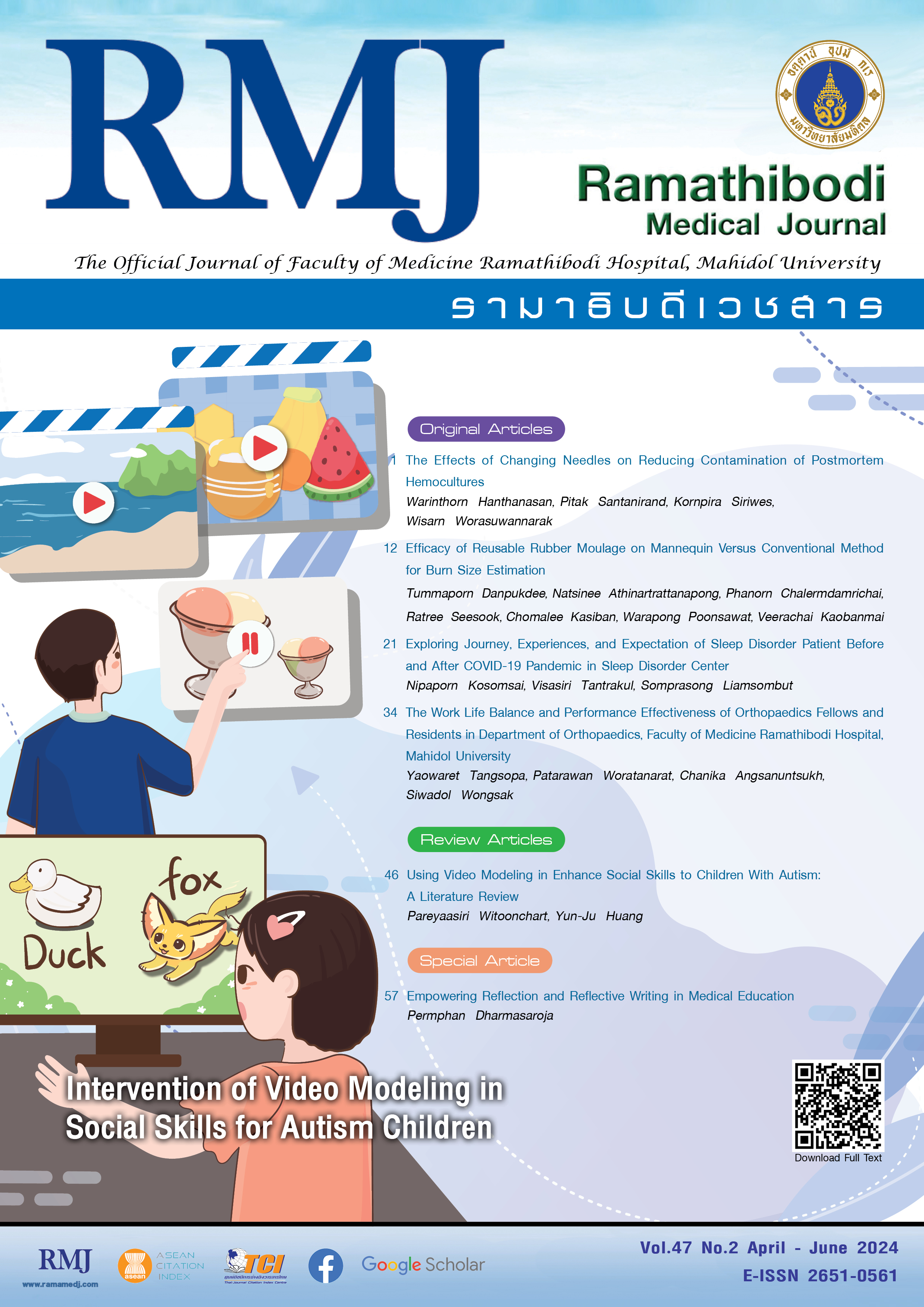Empowering Reflection and Reflective Writing in Medical Education
DOI:
https://doi.org/10.33165/rmj.2024.47.2.267231Keywords:
Reflection, Reflective writing, Reflective model, Medical educationAbstract
Reflection and reflective writing serve as integral components in medical education. They enable students to delve deeper into their experiences, fostering a profound understanding of clinical scenarios and patient interactions, nurturing self-awareness, critical thinking, and empathy. The term “reflection” carries multiple interpretations, all encapsulating the concept of understanding oneself and the surrounding environment to inform future behavior. In the realm of medical education, both students and medical teachers encounter challenges in navigating reflective practices, necessitating guidance and support throughout the process. Effective reflection between students and medical teachers in clinical settings requires adept navigation through potential difficulties in open discussions and managing the emotional impact. To address these challenges, medical teachers must possess heightened self-awareness and adaptability to cater to the diverse needs of individual students. Various models have offered frameworks to organize the reflective process, categorizing them into ‘iterative’ and ‘vertical’ approaches. Successful application involves a selective combination of elements from different models to customize reflective practices. Comprehending reflection and reflective writing is paramount for medical teachers as it empowers them to mentor students effectively, nurturing a culture of reflective practitioners. This fosters continual learning, ethical practice, and professional development among future healthcare professionals.
References
University of Wolverhampton. Skills for Learning: Guide to Reflective Writing. Accessed November 30, 2023. https://www.wlv.ac.uk/lib/media/departments/lis/skills/study-guides/LS006---Guide-to-Reflective-Writing.pdf
Cole M. Learning through reflective practice: a professional approach to affective continuing professional development among healthcare professionals. Res Post-Compuls Educ. 2000;5(10):23-38. doi:10.1080/13596740000200067
Branch WT Jr, George M. Reflection-based learning for professional ethical formation. AMA J Ethics. 2017;19(4):349-356. doi:10.1001/journalofethics.2017.19.4.medu1-1704
Dewey J. How We Think: A Restatement of the Relation of Reflective Thinking to the Educative Process. D.C. Heath & Co Publishers; 1933.
Kolb DA. Experiential Learning: Experience as the Source of Learning and Development. Prentice Hall; 1984.
Boud D, Keogh R, Walker D. Reflection: Turning Experience into Learning. Kogan Page; 1985.
Gibbs G. Learning by Doing: A Guide to Teaching and Learning Methods. Further Education Unit at Oxford Polytechnic; 1988.
Sandars J. The use of reflection in medical education: AMEE Guide No. 44. Med Teach. 2009;31(8):685-695. doi:10.1080/01421590903050374
Schön DA. The Reflective Practitioner: How Professionals Think in Action. Basic Books; 1983.
Vygotsky LS. Mind in Society: The Development of Higher Psychological Processes. Harvard University Press; 1978.
Lave J and Wenger E. Situated Learning: Legitimate Peripheral Participation. Cambridge University Press; 1991.
Tomlinson J. Using clinical supervision to improve the quality and safety of patient care: a response to Berwick and Francis. BMC Med Educ. 2015;15:103. doi:10.1186/s12909-015-0324-3
Marton F, Saljo R. On qualitative differences in learning: I-outcome and process. Br J Educ Psychol. 1976;46(1):4-11. doi:10.1111/j.2044-8279.1976.tb02980.x
General Medical Council. Promoting excellence: standards for medical education and training. July 15, 2015. Accessed November 30, 2023. https://www.gmc-uk.org/-/media/documents/promoting-excellence-standards-for-medical-education-and-training-2109_pdf-61939165.pdf
General Medical Council. The Reflective Practitioner: Guidance for doctors and medical students. Accessed November 30, 2023. https://www.gmc-uk.org/-/media/documents/dc11703-pol-w-the-reflective-practioner-guidance-20210112_pdf-78479611.pdf
Moon J. A Handbook of Reflective and Experiential Learning: Theory and Practice. Routeledge Falmer; 2004.
Boud D, Walker D. Promoting reflection in professional courses: the challenge of context. Stud High Educ. 1998;23(2):191-206. doi:10.1080/03075079812331380384
Finlay L. Reflecting on ‘Reflective practice’. Practice-based Professional Learning Paper 52. The Open University; 2008. Accessed November 30, 2023. https://oro.open.ac.uk/68945/1/Finlay-%282008%29-Reflecting-on-reflective-practice-PBPL-paper-52.pdf
Academy of Medical Royal Colleges. Improving feedback and reflection to improve learning: a practical guide for trainees and trainers. May 10, 2017. Accessed November 30, 2023. http://www.aomrc.org.uk/wp-content/uploads/2017/06/Improving_Feedback_0517-2.pdf
Mann K, Gordon J, MacLeod A. Reflection and reflective practice in health professions education: a systematic review. Adv Health Sci Educ Theory Pract. 2009;14(4):595-621. doi:10.1007/s10459-007-9090-2
Driscoll J. Reflective practice for practise. Sr Nurse. 1994;14(1):47-50.
Borton T. Reach, Touch, and Teach: Student Concerns and Process Education. McGraw-Hill; 1970.
Mezirow J. Transformative Dimensions of Adult Learning. Jossey-Bass; 1991.
Hatton N, Smith D. Reflection in teacher education: towards definition and implementation. Teach Teach Educ. 1995;11(1):33-49. doi:10.1016/0742-051X(94)00012-U
Johns C. Framing learning through reflection within Carper’s fundamental ways of knowing in nursing. J Adv Nurs. 1995;22(2):226-234. doi:10.1046/j.1365-2648.1995.22020226.x
Johns C. Becoming a Reflective Practitioner: A Reflective and Holistic Approach to Clinical Nursing, Practice Development and Clinical Supervision. Blackwell Science; 2000.
Moon J. Learning Journals: A Handbook for Academics, Students and Professional Development. Kogan Page; 1999.
Brookfield S. Becoming a Critically Reflective Teacher. Jossey Bass; 2005.
Driscoll J. Supported reflective learning: the essence of clinical supervision? In: Driscoll J, eds. Practising Clinical Supervision: A Reflective Approach for Healthcare Professionals, 2nd ed. Bailliere Tindall; 2007:27-50.
Ryan M. Improving reflective writing in higher education: a social semiotic perspective. Teach High Educ. 2011;16(1):99-111. doi:10.1080/13562517.2010.507311
Downloads
Published
How to Cite
Issue
Section
License
Copyright (c) 2024 Ramathibodi Medical Journal

This work is licensed under a Creative Commons Attribution-NonCommercial-NoDerivatives 4.0 International License.

















